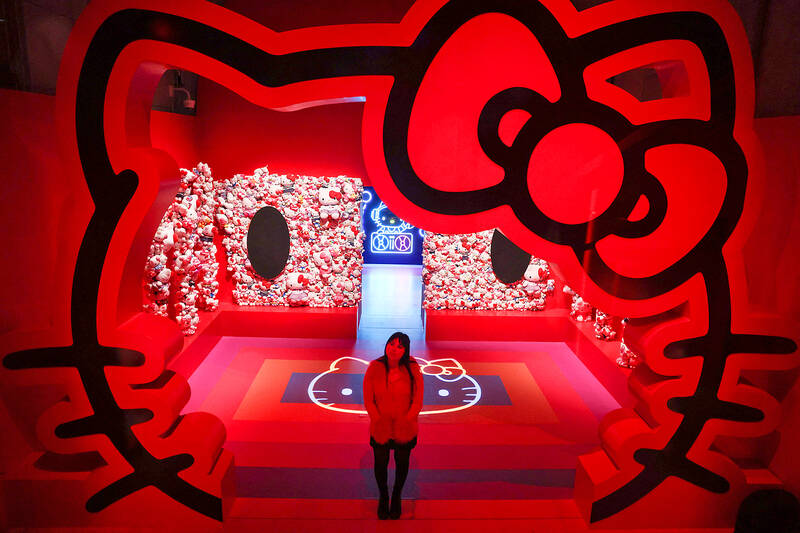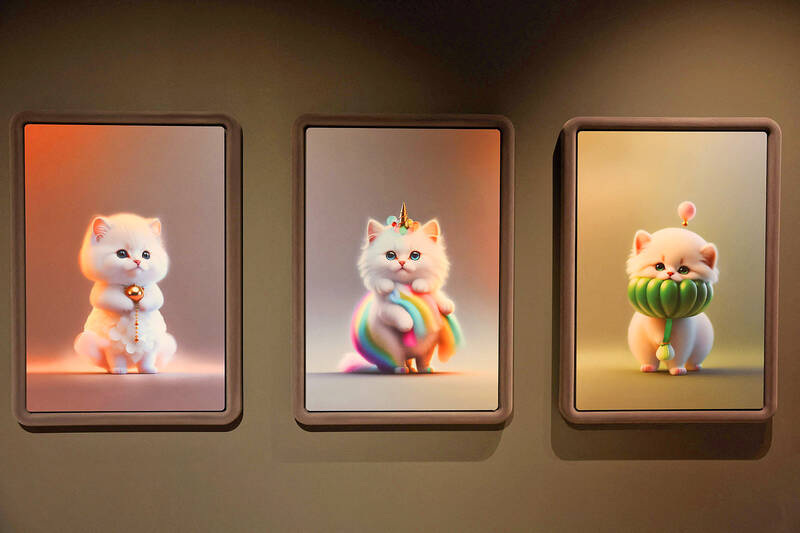From cats and plushies to emojis, a new central London exhibition which opened on Thursday is exploring the “irresistible force” of “cuteness.”
Even before the doors to “CUTE” opened at Somerset House, influencers in Japanese schoolgirl uniforms, Hello Kitty dresses and Pikachu hats playfully posed for photos to charm their social media followers.
The exhibition blends art with an array of musical clips, video games and memes from social media, exploring a largely virtual culture that has swept across the globe with the explosion of the Internet.

Photo: AFP
One room of CUTE is a tribute to cats, which make up some of the most viewed content on the Internet, contrasting 19th-century black-and-white feline photographs with futuristic artificial intelligence-generated rainbow kitten portraits.
Further on, a collage of curly-haired Renaissance cherubs — the original cute babies of art history — intermingles with plush toys, mangas and iconic figures from the kawaii (cute, 可愛) culture that emerged in 20th-century Japan.
For the exhibition’s curator, Claire Catterall, the concept of cute is so vast that she struggles to define it.

Photo: AFP
“The exhibition unpacks what cuteness is, so it’s a very slippery scene,” she said. “It’s very hard to define. It’s very tricky. And in many ways, that’s the power of it. It’s so many different things all at once.”
In sections divided by cat-shaped or rainbow arches, contemporary works share space with commercial products such as Tamagotchi toys or Sylvanian Family figures, reminding visitors that cuteness is a lucrative billion-dollar business.
The CUTE exhibition is sponsored by Japanese company Sanrio Co, which globally markets merchandise of the feline-inspired character Hello Kitty, created about 50 years ago.
Visitors meander under an archway adorned with the character’s likeness, walls blanketed in colorful plush toys, before shimmying under the Hello Kitty disco’s glitter ball.
“Cuteness and capitalism are so closely intertwined,” Catterall said. “There is this kind of quite queasy quality about that which makes people feel really uncomfortable.”
Although cuteness lives “within the capitalist structures which spawned it,” it could also be what disrupts it the most, she added.
The aesthetics of cuteness were once mocked or adopted ironically but its values and dress codes are now championed by many young people as they allow for an “existence outside the norms,” particularly for women and the queer community, Catterall said.
“I think for a long time, cuteness has been considered childish and inconsequential and not serious, but this exhibition will hopefully show that there’s so much more to it than that,” the curator said. “It’s actually really something to be taken seriously, and can tell us so many things about us and the world around it.”
CUTE also touches on a more political dimension of cuteness, in a section featuring a fuchsia pink balaclava from the Russian feminist punk band Pussy Riot, known for their provocative protests against Russian President Vladimir Putin.
As immersive exhibitions and museums proliferate worldwide, CUTE, open to the public until April 4, also emphasizes interactivity.
Visitors can enjoy vintage Japanese video games in an arcade room or relax at a “pyjama party” in a vast teen bedroom complete with bean bags and pop music, created by British artist Hannah Diamond.
“It’s exuberant, it’s exhilarating, it’s empowering,” Catterall said. “We wanted to create a space where people could come in, dance, feel really happy, cover themselves in Hello-Kitty-glow of goodness.”
Cuteness is not just an “aesthetic,” she said. “It’s a feeling.”

Vincent Wei led fellow Singaporean farmers around an empty Malaysian plot, laying out plans for a greenhouse and rows of leafy vegetables. What he pitched was not just space for crops, but a lifeline for growers struggling to make ends meet in a city-state with high prices and little vacant land. The future agriculture hub is part of a joint special economic zone launched last year by the two neighbors, expected to cost US$123 million and produce 10,000 tonnes of fresh produce annually. It is attracting Singaporean farmers with promises of cheaper land, labor and energy just over the border.

US actor Matthew McConaughey has filed recordings of his image and voice with US patent authorities to protect them from unauthorized usage by artificial intelligence (AI) platforms, a representative said earlier this week. Several video clips and audio recordings were registered by the commercial arm of the Just Keep Livin’ Foundation, a non-profit created by the Oscar-winning actor and his wife, Camila, according to the US Patent and Trademark Office database. Many artists are increasingly concerned about the uncontrolled use of their image via generative AI since the rollout of ChatGPT and other AI-powered tools. Several US states have adopted

A proposed billionaires’ tax in California has ignited a political uproar in Silicon Valley, with tech titans threatening to leave the state while California Governor Gavin Newsom of the Democratic Party maneuvers to defeat a levy that he fears would lead to an exodus of wealth. A technology mecca, California has more billionaires than any other US state — a few hundred, by some estimates. About half its personal income tax revenue, a financial backbone in the nearly US$350 billion budget, comes from the top 1 percent of earners. A large healthcare union is attempting to place a proposal before

KEEPING UP: The acquisition of a cleanroom in Taiwan would enable Micron to increase production in a market where demand continues to outpace supply, a Micron official said Micron Technology Inc has signed a letter of intent to buy a fabrication site in Taiwan from Powerchip Semiconductor Manufacturing Corp (力積電) for US$1.8 billion to expand its production of memory chips. Micron would take control of the P5 site in Miaoli County’s Tongluo Township (銅鑼) and plans to ramp up DRAM production in phases after the transaction closes in the second quarter, the company said in a statement on Saturday. The acquisition includes an existing 12 inch fab cleanroom of 27,871m2 and would further position Micron to address growing global demand for memory solutions, the company said. Micron expects the transaction to